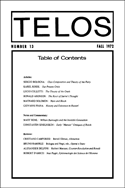By Telos Press · Monday, September 16, 2013 Karel Kosík and Dialectics of the Concrete Prague, June 4–6, 2014
A conference organised by the Department for the Study of Modern Czech Philosophy, Institute of Philosophy, Academy of Sciences of the Czech Republic.
In 1963 Karel Kosík published his path-breaking book Dialectics of the Concrete. It made an impact on both Marxist and non-Marxist thinkers, in Czechoslovakia and throughout the world. In this work Kosík set for himself an ambitious task—to re-think the basic concepts of the Marxist philosophical tradition and to employ them in the analysis of social reality. In the course of his analysis he touched on a wide array of issues that are still relevant today, including the problem of mystification or the “pseudo-concrete,” the social role of art, the conception of reality as a concrete totality, the conception of the human being as an onto-formative being, the systematic connection between labour and temporality, the relationship between praxis and labour, and the explanatory power of the dialectical method.
Continue reading →
By James Santucci · Tuesday, December 18, 2012 As an occasional feature on TELOSscope, we highlight a past Telos article whose critical insights continue to illuminate our thinking and challenge our assumptions. Today, James Santucci looks at Karel Kosík’s “Our Present Crisis” from Telos 13 (Fall 1972).
 Karel Kosík’s story begins with the end of a statue. In 1962, a granite statue of Stalin that had been begun in 1955 was completed only to be torn down several months later. For Kosík, the statue, “designed to last forever,” perfectly represented the provisionalism and nihilism of modern times. It laid bare the inescapable tension between living peacefully in social life and the animal brutality that occasionally became necessary. When the statue was torn down, the base was left behind. In Kosík’s time, there were plans to transform the space into a garden restaurant. The restaurant’s relationship to its past would be complicated, but plans were scrapped, which saved any Prague tourists from the awkwardness of “Would you like to see our drink menu while you contemplate what it means to live under threat of random and instantaneous erasure?” Karel Kosík’s story begins with the end of a statue. In 1962, a granite statue of Stalin that had been begun in 1955 was completed only to be torn down several months later. For Kosík, the statue, “designed to last forever,” perfectly represented the provisionalism and nihilism of modern times. It laid bare the inescapable tension between living peacefully in social life and the animal brutality that occasionally became necessary. When the statue was torn down, the base was left behind. In Kosík’s time, there were plans to transform the space into a garden restaurant. The restaurant’s relationship to its past would be complicated, but plans were scrapped, which saved any Prague tourists from the awkwardness of “Would you like to see our drink menu while you contemplate what it means to live under threat of random and instantaneous erasure?”
Continue reading →
|
|
 Karel Kosík’s story begins with the end of a statue. In 1962, a granite statue of Stalin that had been begun in 1955 was completed only to be torn down several months later. For Kosík, the statue, “designed to last forever,” perfectly represented the provisionalism and nihilism of modern times. It laid bare the inescapable tension between living peacefully in social life and the animal brutality that occasionally became necessary. When the statue was torn down, the base was left behind. In Kosík’s time, there were plans to transform the space into a garden restaurant. The restaurant’s relationship to its past would be complicated, but plans were scrapped, which saved any Prague tourists from the awkwardness of “Would you like to see our drink menu while you contemplate what it means to live under threat of random and instantaneous erasure?”
Karel Kosík’s story begins with the end of a statue. In 1962, a granite statue of Stalin that had been begun in 1955 was completed only to be torn down several months later. For Kosík, the statue, “designed to last forever,” perfectly represented the provisionalism and nihilism of modern times. It laid bare the inescapable tension between living peacefully in social life and the animal brutality that occasionally became necessary. When the statue was torn down, the base was left behind. In Kosík’s time, there were plans to transform the space into a garden restaurant. The restaurant’s relationship to its past would be complicated, but plans were scrapped, which saved any Prague tourists from the awkwardness of “Would you like to see our drink menu while you contemplate what it means to live under threat of random and instantaneous erasure?” 






